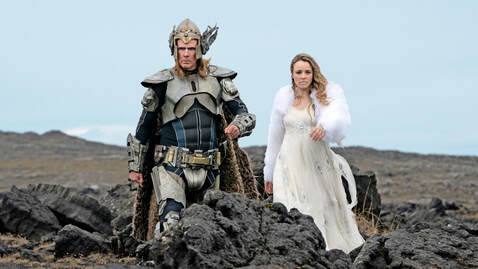C | An accident-prone singing duo dreams of competing in the Eurovision Song Contest. Directed by David Dobkin Starring Will Ferrell, Rachel McAdams, and Dan Stevens Review by Jon Kissel |

When Eurovision leans into those crowd-pleasing spectacle, it’s working. Lars’ imaginary music video, equipped as he is with a giant codpiece, sets the tone for what’s to be expected, and, based on the appearance of real Eurovision stars, he’s not dreaming big enough. The sing-along, taking place in a fantastical music video that would break the reality of the film if it weren’t purposefully trying to be ridiculous, won me over, as did the pop appeal of Ja Ja Ding Dong. When the characters take the stage, I’m pulled back in each time, whether it’s for Fire Saga’s comic failures or Lemtov’s (Dan Stevens) campy belting. The energy of the film, and much of its comedy, is rooted on the stage and it’s a mystery why the film doesn’t spend more time there.
The blame for what goes wrong must land on Ferrell, Dobkin, and editor Greg Hayden. There’s more than thirty minutes that needs to be cut out of this movie. The improv scenes reek of needless elongation. We’re a long, long way from Ferrell, Adam Scott, and Rob Riggle arguing over the best way to eat a dick in Step Brothers. Here, Ferrell and McAdams just mirror each other back and forth. The antagonist financier, played by Mikael Persbrandt, has fascinating motivations but is really in the film for a single joke about elves. If the boat explosion that he triggers is caused by an accident, or even better, by the elves, then he can be completely cut out. The interminable sequence between the failed Fire Saga performance at Eurovision and Lars running back onstage for the finale is ripped directly from Wedding Crashers, such that the film separates its love interests before inevitably bringing them back together. Send Lars’ disappointed father (Pierce Brosnan) to Edinburgh to congratulate his son in person for not quitting on an accident-plagued set, and the film’s twenty minutes shorter.
Ferrell hasn’t been great in a comedy in years, and Eurovision isn’t breaking that streak. McAdams, on the other hand, is working hard to elevate the material. Her Sigrit has a much more compelling goal than Lars,’ who’s just rehashing every Ferrell protagonist of the last two decades. She’s been willfully tied to him for almost her whole life and uses this opportunity to express something greater than a desire to win a competition, what the film refers to as the speorg or the truest expression of one’s self. That the film allows her to do so and then doesn’t subtitle her Icelandic singing is its greatest idea. McAdams’ dramatic chops make this moment as surprisingly powerful as it is, but she also is the funniest actor in the film as well, with the possible exception of the angry Ja Ja Ding Dong fan. After Game Night, this is the second comedy in a row that requires her to have conflicting feelings about a gruesome death, and the combination of shock and shameful relief is so perfectly calibrated that it’s becoming her signature move.
McAdams’ strength in all aspects of her performance and the generally strong musical scenes aren’t enough to make me forget the irritation that is most of Eurovision. The beats of this film are predictable and unsurprising and waiting for the obvious to happen, without the oases of comedy that Ferrell used to be good at, makes this a trial to get through. If Dobkin et al wanted to turn the viewer into the Ja Ja Ding Dong fan, screaming at the screen to skip the filler and get to what we all know is coming, then they’ve done so. I can now empathize with a stocky Icelander who just wants to hear a song about an engorged penis. C
 RSS Feed
RSS Feed